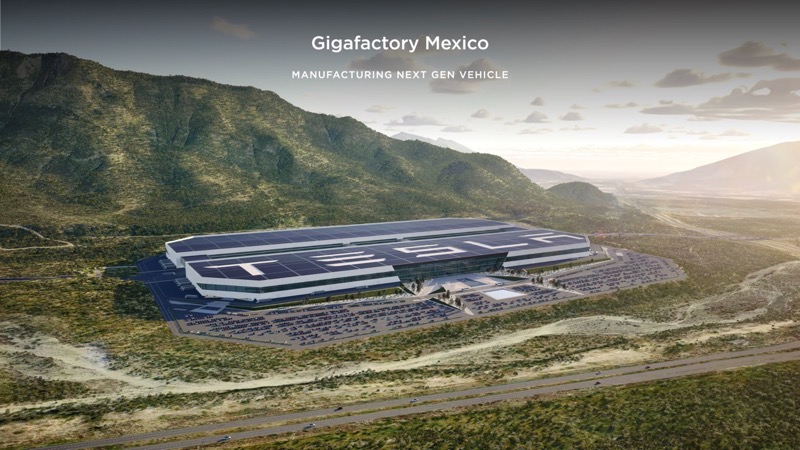
Tesla Encourages Chinese Suppliers to Open Factories in Mexico: Report

Tesla is reportedly encouraging numerous Chinese suppliers to establish factories in Mexico, reports unnamed sources speaking to 36kr. The urgency of this transition, according to industry insiders, lies in Tesla’s ambitious plan to emulate its efficient Giga Shanghai overseas.
Tesla suppliers, including the Xusheng Group, have already revealed intentions to build factories in Mexico this year. The Xusheng Group disclosed plans in March for a production base in Mexico, with an investment capped at $276 million. The project, officially inaugurated in late May in Coahuila, Mexico, is expected to commence production by mid-2024, provided there are no unforeseen delays.
Multiple domestic production line equipment manufacturers are also catching up with this trend, setting up offices in Mexico to handle design, after-sales support, and other operational facets. Some suppliers have even transported production line workers directly to Mexico to expedite factory construction.
During this year’s Investor Day, Tesla announced the location for its fifth Gigafactory in Monterrey, the capital of Nuevo Leon, Mexico. Mexican authorities have declared that the investment for this facility will surpass $5 billion, with the plant anticipated to produce 1 million “next-gen” vehicles annually. However, considering the planned land use, the Monterrey factory’s production capacity could potentially exceed this figure.
Tesla has been able to deliver 1.31 million vehicles globally in 2022, with its Shanghai factory accounting for more than 710,000 vehicles, underpinning Tesla’s impressive annual gross profit margin of 28.5%. By fostering the transition of a well-established supply chain to overseas operations, Tesla reportedly hopes to replicate the success of Giga Shanghai but in Mexico.
Tesla’s automotive business senior vice president, Zhu Xiaotong (Tom Zhu), is reportedly focusing heavily on the Monterrey factory. Zhu’s previous efforts had spearheaded the completion and commissioning of Giga Shanghai.
The United States-Mexico-Canada Agreement (USMCA), which came into effect on July 1, 2020, has also played a significant role in this shift. The agreement mandates that to enjoy zero tariffs, 75% of an automobile’s components must be manufactured within the region, a substantial increase from the previous requirement of 62.5%. Tesla’s recent moves align seamlessly with this trend.
Tesla suppliers establishing operations in Mexico have reportedly already secured orders from Tesla and other North American customers. However, unlike domestic factories that can obtain land and financial support, companies in Mexico generally benefit from tax incentives and talent subsidies.
Mexico already boasts a substantial automotive industry, with numerous Chinese companies like Joyson Electronics and Sanhua Intelligent Control extending their operations there. Coupled with local industrial support and the advantages of reaching American markets, Tesla’s Monterrey factory marks a significant leap for the company’s production in the forthcoming years.
Despite Mexico’s low labor costs and comprehensive industrial chain, some industry insiders caution that the country’s market maturity lags behind Europe and America, and social and geographical risks could be comparatively higher. As such, companies are encouraged to consider the boundaries and effects of their investments carefully.

